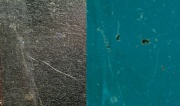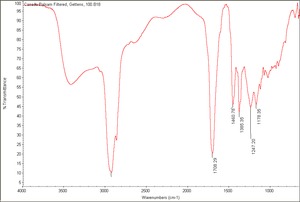Difference between revisions of "Canada balsam"
Jump to navigation
Jump to search
m (Text replace - "== Authority ==" to "== Sources Checked for Data in Record ==") |
|||
| (3 intermediate revisions by 2 users not shown) | |||
| Line 6: | Line 6: | ||
== Synonyms and Related Terms == | == Synonyms and Related Terms == | ||
| − | + | Canadabalsem (Ned.); bálsamo de Canadá (Esp.); Balsamo del Canada (It); Canada turpentine; balsam of fir; Canadian balsam | |
| − | == | + | [[[SliderGallery rightalign|Canada Balsam Filtered, Gettens, 100.B18.TIF~FTIR (MFA)]]] |
| + | == Physical and Chemical Properties == | ||
| − | Soluble in ether, amyl alcohol, chloroform, toluene, benzene, xylene, carbon tetrachloride. Insoluble in water. Slightly fluorescent. | + | * Soluble in ether, amyl alcohol, chloroform, toluene, benzene, xylene, carbon tetrachloride. Insoluble in water. |
| + | * Slightly fluorescent. | ||
| + | * Saponification number = 89-95 | ||
| + | * Acid number = 81-86 | ||
| + | * Density = 0.987-0.994 g/ml | ||
| + | * Refractive Index = 1.520-1.545 | ||
| − | + | == Resources and Citations == | |
| + | * Alden Identification Services, Microscopic Wood Identification: [https://wood-identification.com/wood-types/ Link] | ||
| − | + | * H. A. Alden, A.C. Wiedenhoeft, "Qualified Determination of Provenance of Wood of the Firs (Abies spp. Mill) Using Microscopic Features of Rays: An Aid to Conservators, Curators and Art Historians" AIC Poster, reprinted online at [http://www.si.edu/scmre/abies.html http://www.si.edu/scmre/abies.html] | |
| − | |||
| − | |||
| − | |||
| − | |||
| − | |||
| − | |||
| − | |||
| − | |||
| − | |||
| − | |||
| − | H. A. Alden, A.C. Wiedenhoeft, "Qualified Determination of Provenance of Wood of the Firs (Abies spp. Mill) Using Microscopic Features of Rays: An Aid to Conservators, Curators and Art Historians" AIC Poster, reprinted online at [http://www.si.edu/scmre/abies.html http://www.si.edu/scmre/abies.html] | ||
| − | |||
| − | |||
* ''The Merck Index'', Martha Windholz (ed.), Merck Research Labs, Rahway NJ, 10th edition, 1983 Comment: Entry # 973 | * ''The Merck Index'', Martha Windholz (ed.), Merck Research Labs, Rahway NJ, 10th edition, 1983 Comment: Entry # 973 | ||
Latest revision as of 14:52, 18 May 2022
Description
A crystal clear, resinous exudate from the Canadian Balsam fir, Abies balsamea, native to the northeastern United States and Canada. Canada balsam was introduced into Europe in the 18th century. It was used for a short time as a varnish, but was found to bloom in moist conditions and darken with age. Canada balsam is currently used to permanently mount microscopy specimens. Its softening point is slightly above room temperature. Canada balsam is also used as an adhesive for optical lenses.
Synonyms and Related Terms
Canadabalsem (Ned.); bálsamo de Canadá (Esp.); Balsamo del Canada (It); Canada turpentine; balsam of fir; Canadian balsam
Physical and Chemical Properties
- Soluble in ether, amyl alcohol, chloroform, toluene, benzene, xylene, carbon tetrachloride. Insoluble in water.
- Slightly fluorescent.
- Saponification number = 89-95
- Acid number = 81-86
- Density = 0.987-0.994 g/ml
- Refractive Index = 1.520-1.545
Resources and Citations
- Alden Identification Services, Microscopic Wood Identification: Link
- H. A. Alden, A.C. Wiedenhoeft, "Qualified Determination of Provenance of Wood of the Firs (Abies spp. Mill) Using Microscopic Features of Rays: An Aid to Conservators, Curators and Art Historians" AIC Poster, reprinted online at http://www.si.edu/scmre/abies.html
- The Merck Index, Martha Windholz (ed.), Merck Research Labs, Rahway NJ, 10th edition, 1983 Comment: Entry # 973
- R. J. Gettens, G.L. Stout, Painting Materials, A Short Encyclopaedia, Dover Publications, New York, 1966 Comment: refractive index = 1.5194 to 1.5213
- G.S.Brady, Materials Handbook, McGraw-Hill Book Co., New York, 1971 Comment: p. 83
- Ralph Mayer, A Dictionary of Art Terms and Techniques, Harper and Row Publishers, New York, 1969 (also 1945 printing)
- ASTM, Standard Terminology of Microscopy, Annual Book of ASTM Standards, Section 14, General Methods and Instrumentation, ASTM, E175, 75-78, May 1982 Comment: refractive index = 1.530 to 1.545
- Dictionary of Building Preservation, Ward Bucher, ed., John Wiley & Sons, Inc., New York City, 1996
- Kurt Wehlte, The Materials and Techniques of Painting, Van Nostrand Reinhold Co., New York, 1975 Comment: p. 394
- John S. Mills, Raymond White, The Organic Chemistry of Museum Objects, Butterworth Heineman, London, 2nd ed., 1994
- Susan E. Schur, Conservation Terminology: A review of Past & Current Nomenclature of Materials, Technology and Conservation, Spring (p.34-39); Summer (p.35-38); Fall (p.25-36), 1985
- Art and Architecture Thesaurus Online, http://www.getty.edu/research/tools/vocabulary/aat/, J. Paul Getty Trust, Los Angeles, 2000
- CRC Handbook of Chemistry and Physics, Robert Weast (ed.), CRC Press, Boca Raton, Florida, v. 61, 1980 Comment: ref. index=1.530

